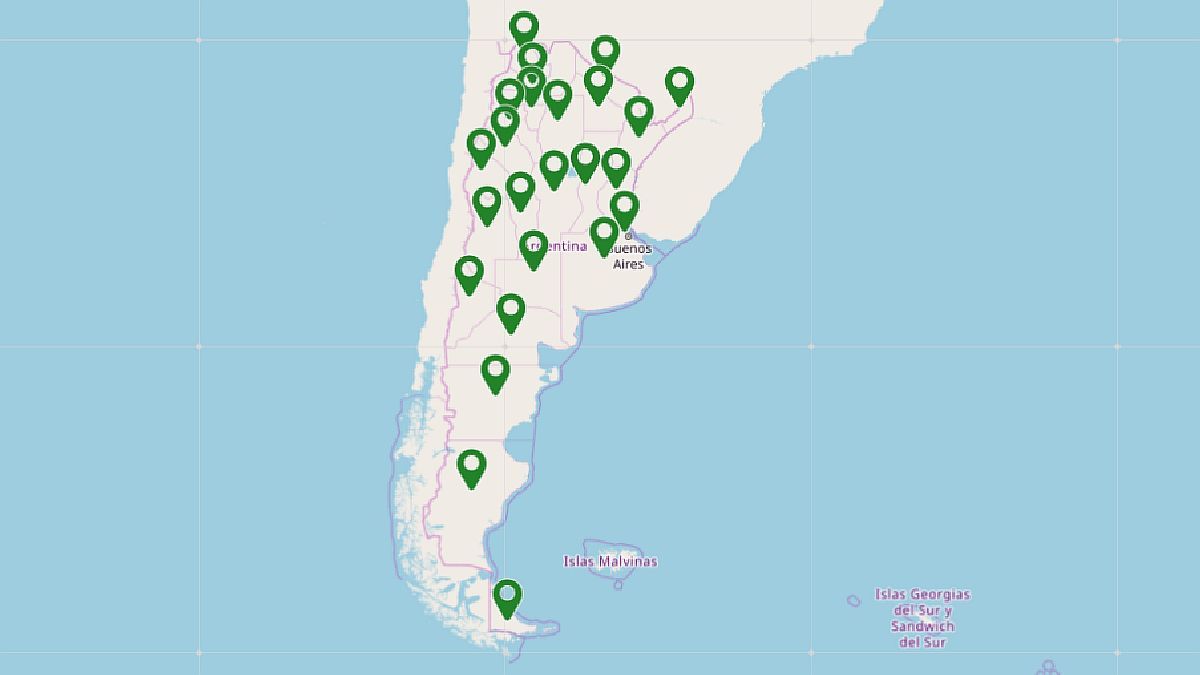This situation generated significant revenue-generating benefits in those jurisdictions where taxpayers recorded low levels of invoicing and was harmless for those where revenue levels regularly maintained a high level of representativeness.
This modality became even more unfair, given that the annual sales parameters set were not updated over the last 10 years in accordance with the evolution of the inflation rates of each period, a situation that “unfairly” caused an increasing number of “SMEs” to suffer an annual increase in their ISIB rates.(2)
Now, what happens in the relationship between local billing and total sales?
1. Jurisdictions with lower billing representation in relation to total country sales.
If in these jurisdictions the actual amount of sales obtained within their territorial scope were considered, there would be no legal arguments to justify the increase in rates without affecting basic constitutional principles or the much sought-after tax harmonization.
For example, if in the Province of Tucumán (in this case) the sales made throughout the country by a taxpayer “A” that exceed the annual parameters were considered, with another “B” that does not exceed said annual parameters but that in that jurisdiction maintains billing levels substantially higher than “A”, an inequity would be produced such that would make “A” (with lower sales in Tucumán) pay a higher tax rate than “B” even though the latter registered higher sales.
Such a situation, for example, would affect the constitutional principle of “equality before the law,” among others.
2. Jurisdictions with the greatest representativeness of billing in relation to total sales in the country.
Following the example stated in section 1 in the majority of cases in these jurisdictions the principle of equality would not be affected and they could also establish the scale of progressivity of their rates considering only the sales obtained in their territorial area.
Arguments of the SCJN in the “Petroarsa SA” ruling
With the dissent of Judge Rosatti, the SCJN ruled by majority that the consideration of the total amount of G, NG and E sales obtained throughout the country breaks the congruent and reasonable connection that must inevitably exist between the taxable event, the quantum of the tax levy and the territorial basis of the tax.
From this perspective, it is clear that each province can only collect the ISIB, solely, for the activity carried out within its territorial scope and the income will form part of its tax base as long as it represents a “reasonable index to measure the wealth produced” by the activity developed in said spatial scope.
Consequently, it must be considered that income generated by activities carried out outside the Province cannot be taken into account to quantify the amount of tax liability accrued by the activity carried out within that province – the only one that can be taxed by the jurisdiction -, whether it is intended to consider them to form the taxable base of the ISIB or to graduate its rate.
Furthermore, as highlighted by the CSJN, in other cases the Supreme Court of Justice of the Province of Tucumán (3) itself ruled that “… sales obtained in a foreign jurisdiction are ultimately veiledly taxed, since they are the ones that cause the application of a higher percentage, and with it, the increase in the quantum debeatur”
In fact, the 24 provincial jurisdictions define in their respective tax codes that the ISIB taxes the exercise of activity carried out “exclusively” within their own territorial scope, a situation that defines this tax as a tribute of a territorial, real and direct nature – although part of the doctrine considers it indirect -.
In its ruling, the Supreme Court of Justice of the Nation highlights the contradictory arguments used by the Supreme Court of Justice of the Province of Tucumán when resolving the “Petroarsa SA” case compared to those used when resolving the “Gasnor SA” and Yuhmak SA cases.
Indeed, in “Petroarsa” its ruling was favorable to the Province of Tucumán while in the last two and after the first it was in favor of the respective taxpayers.
Conclusion
Our Supreme Court has held that no province may legislate with reference to persons or things that are found, produced or marketed outside its own jurisdiction, given that the powers conferred by the National Constitution are to be exercised only within its territorial scope.
The adoption of the federal form of government implies the coexistence of a general power and local powers that interact throughout the Nation and only in a specific province, respectively, so that only within their own limits do the latter exercise all the power not delegated to the federal government.
Thus, with respect to the definition of the taxable event, tax base, rates, exemptions and payment conditions, the provinces maintain their exclusive jurisdiction without the Courts of the Nation being able to declare them ineffective on the grounds of being oppressive, unjust or inconvenient, if they are not contrary to the Constitution.
In this context, each provincial jurisdiction maintains the power to tax with the ISIB only the activity carried out within its territorial space and the concepts that will form the determined tax base will be those that represent a “reasonable index that allows measuring the wealth produced” in that spatial area.
Finally, adopting the ruling of the Attorney General’s Office, the SCJN concludes that in this case, by considering the income generated outside the province both to determine the tax base and to graduate the intensity of the tax burden by increasing the rates, the Province of Tucumán resorts to a strange scale to measure the taxpayer’s tax capacity.
In this case, the criterion supported by the Province of Tucumán violates the criterion of territoriality that arises from the definition of the taxable event of its own tax code, as well as alters the criterion of territorial support based on the same fact that arises from the Multilateral Convention to which it adhered in a timely manner, and finally, it also affects the provisions of article 9 of Law 23,548 to which it adhered without limitations or reservations by indirectly capturing and through the increase of the rates activities developed outside the spatial scope of its competence.
The unconstitutionality declared by the Supreme Court implies not only a limitation on jurisdictional overreach for exclusively revenue-raising purposes, but will also bring with it a large number of appeals for the repetition of the excess ISIB collected.
Public accountant. Director of Tax&Legal Business Advisor SRL
(1) SCJN, Petroarsa SA v. Province of Tucumán, 8/20/2024.
(2) Presentation at the XXIII International on local taxation. San Juan. 11/2023. Taxpaying capacity. Cases in which it constitutes a constitutional principle in crisis.
(3) SCJ of the Province of Tucumán, Gasnor SA v. Province of Tucumán, 10/27/2020, and, Yuhmak SA v. Province of Tucumán, 11/26/2020.
Source: Ambito
David William is a talented author who has made a name for himself in the world of writing. He is a professional author who writes on a wide range of topics, from general interest to opinion news. David is currently working as a writer at 24 hours worlds where he brings his unique perspective and in-depth research to his articles, making them both informative and engaging.




